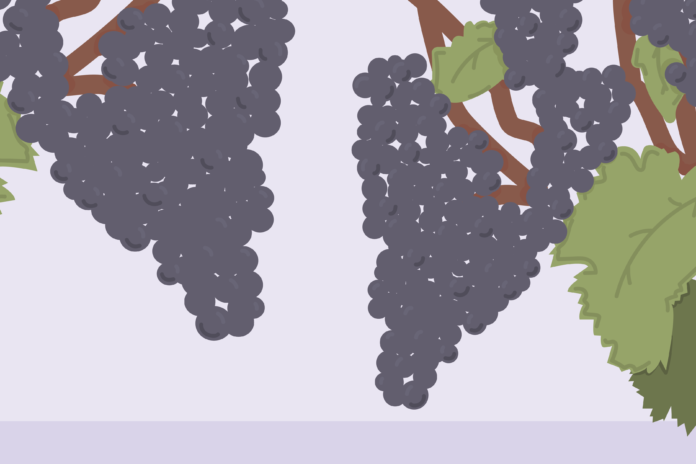Professors at the UC Davis Postharvest Technology Center provide some useful tips to better select and preserve grapes
By YASH RATHI — science@theaggie.org
Researchers at the UC Davis Postharvest Technology Center recently discussed improving the quality of post-harvest produce and how to prevent it from rotting. Specifically, two professors from the UC Davis College of Agricultural and Environmental Sciences provided some useful tips to preserve, wash and choose grapes in order to prolong the freshness and shelf life of the fruit.
Dr. Elizabeth Mitcham, the director at the UC Davis Postharvest Technology Center, said that the first step is to choose the right grapes at the grocery store. Choose a bunch that is firmly attached to the main vine, a green, strong stem and has no visible deterioration around individual grapes. Grapes with brown stems indicate that they are ahead in the ripening process and have lost a lot of moisture due to evaporation and ripening.
It is generally advised to buy and store grapes that are still on the vine. However, when buying loose grapes in a packed box, make sure that they are refrigerated or consumed quickly. The preservation of grapes is important, especially for loose grapes, according to Mitcham.
“The grape off the vine will have a shorter shelf life due to small injuries from removing stems,” Mitcham said.
Dr. Irwin R. Donis-Gonzale, an assistant professor at UC Davis who specializes in biological and agricultural engineering, said that temperature is key to keeping grapes fresh — and you can tell if they’ve been stored at the proper temperature a few ways.
“When it comes to grape growth and preservation, temperature management is really important,” Donis-Gonzale said. “It should be around 32˚C to grow grapes. The stems of the grapes are a good indicator. If they lose moisture before the fruit is dry [brown], then they haven’t had proper temperature management while they were cultivated.”
It is also important to look for locally-grown grapes rather than imported ones, as they have the shortest route from the farm to the store, so they are usually fresher and of better quality.
You can also assess grape freshness by looking at the color of grape skins. Green grapes’ skins should have a slight yellow tint, black grapes’ should be a rich purple color and red grapes’ should be a purple-red color with no green tint. Buy local grapes rather than imported ones because they have the shortest route from the farm to the store, making them fresher and of better quality.
“Shininess does reflect a higher-quality product,” Donis-Gonzale said. “Moisture loss and shriveling causes grapes to lose shininess”
Some buyers believe that if a powdery white coating, called “bloom,” is on the grapes, it means that they are fresh, Mitcham said.
Once you get home, storing grapes properly is crucial. Usually, one should wash any fruit or vegetable before storing it, but this method should not be applied to grapes. According to Mitcham, washing grapes before storing them leads to quicker deterioration. Especially if the grapes are not fully dried before being stored, it can activate the process of degradation at a faster rate. Per online suggestions, rinsing the fruits with vinegar before storing them in an air-tight container may help in the preservation process. It’s also advisable to simply wash them right before you eat them.
Mitcham further advised storing grapes in a high-humidity environment, which can reduce water loss due to evaporation. Putting them in a plastic bag with pencil-sized holes in it, for example, will maintain the proper humidity level with the environment, preventing the grapes from deteriorating.
Once grapes are stored in the refrigerator, they can last up to a week. The exact amount of time they will stay fresh mostly depends on when the grapes were harvested, purchased and stored. If they are deep-freezed, they can last up to three months, provided that they were washed and dried right before they were freezed.
Following the above steps and tips, as recommended by Mitcham and Donis-Gonzale, can help your grapes last longer while tasting just as fresh and juicy at any time.
Written by: Yash Rathi — science@theaggie.org









